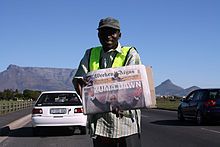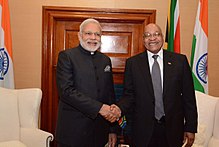Presidency of Jacob Zuma
Zuma's administration launched the R4-trillion National Infrastructure Plan and signed a controversial nuclear power deal with the Russian government, blocked by the Western Cape High Court in 2017.
Few of the attendant policy initiatives were implemented before the end of his presidency, but they included land expropriation without compensation, free higher education, and a series of attempted structural reforms in key sectors, involving restrictions on foreign ownership and more stringent black economic empowerment requirements.
During South Africa's tenure on the United Nations Security Council in 2011–2012, the administration was criticised for vacillating in its stance on foreign military intervention in the Libyan and Syrian civil wars.
By early 2016, there were also widespread allegations – investigated by the Zondo Commission between 2018 and 2021 – that the Gupta family had acquired immense and corrupt influence over Zuma's administration, amounting to state capture.
[7][15] Zuma's critics claim that his policies contributed to an escalation in South Africa's debt burden:[16][17] the debt-to-GDP ratio increased from 28% at the start of his presidency[18] to just over 50% in the week of his resignation.
[22][23] From 2017, at the tail-end of his presidency, his rhetoric and policy priorities became markedly further leftist, under what is known as the "radical economic transformation" (RET) programme of the ANC of this period.
[33] During the tournament, the government implemented special measures to ensure the safety and security of spectators in accordance with standard FIFA requirements,[34] including a temporary restriction of flight operation in the airspace surrounding the stadiums.
[38] On 1 December 2009, in a public address broadcast live on television, he announced the expansion of the country's HIV testing and treatment programme, in line with World Health Organisation guidelines.
[16][45] In October 2012, Zuma launched the National Infrastructure Plan, which was expected to involve spending of around R4 trillion over the next 15 years, with transport and energy as the biggest expenditure items.
[48][49] Amid ongoing electricity generation shortfalls at state energy utility Eskom,[50] Zuma's government launched, in 2011,[51] the Independent Power Producers Procurement Programme.
[57] In 2017, adjudicating a legal challenge by environmental activists, the Western Cape High Court ruled that the underlying intergovernmental agreements were unlawful, effectively blocking the deal.
[71][72][73][74] He publicly exhorted the ANC parliamentary caucus to partner with the Economic Freedom Fighters (EFF) for the two-thirds majority needed to amend the Constitution to provide for expropriation without compensation.
[72] Also under its RET policy, Zuma's administration pursued consultation processes with labour and business, spearheaded by Ramaphosa (then Deputy President), ahead of the implementation of a national minimum wage.
In August 2009, the new government's strategic framework was published, setting out the broad theme of "Pursuing African Advancement and Enhanced Co-operation" for its foreign policy approach.
[7][78][82][83] In August 2010, Zuma undertook his first state visit to China, which upgraded the countries' relations to a formal and comprehensive bilateral partnership under the Beijing Declaration.
South Africa's admission followed a concerted campaign for membership and has been described as "a huge diplomatic coup" and "the most important foreign policy achievement of the Zuma administration".
Thus in December 2017 Zuma's administration tabled the International Crimes Bill, which would repeal the legislation which had incorporated the ICC's Rome Statute into South African law.
[101] Zuma began his second term amid ongoing controversy over what were officially security upgrades, made with state funds, to his private homestead at Nkandla in KwaZulu-Natal.
[108] A provisional draft of Madonsela's report, under the working title "Opulence on a Grand Scale," was leaked to the Mail & Guardian in late November 2013.
[115] According to legal academic Pierre de Vos, other parts of his statement seriously misinterpreted the judgement,[116] as did the Presidency's claim that Zuma had not been found to have violated his oath of office.
[145][146][147] This relationship received widespread public attention as early as April 2013, when the media reported that the Guptas had landed an Airbus A330 at Waterkloof Air Force Base without formal authorisation.
[162] The SACP called for a public inquiry, and in May a group of 45 former director-generals of government departments wrote a letter to Zuma, Ramaphosa, and two ministers to make the same request.
[163]In early 2017, the Daily Maverick and investigative journalism unit amaBhungane (and later News24), through human rights lawyer Brian Currin and his anonymous clients, gained access to a large cache of between 100,000 and 200,000 emails and other documents from inside the Guptas' businesses.
Most notably, respected Finance Minister Gordhan was replaced by Malusi Gigaba; his deputy Jonas, who had alleged corruption by the Guptas a year earlier, was also fired.
[192] On 7 April 2017, protests against Zuma and his government took place in several of South Africa's major cities, with corruption the March cabinet reshuffle cited as central motivating factors.
The August 2017 motion of no confidence was notable because it was the first allowed to proceed by secret ballot, following the Constitutional Court's judgment in UDM v Speaker of the National Assembly earlier that year.
On Monday 12 December, when it became clear that the negotiations had failed, the ANC National Executive Committee convened an emergency meeting near Pretoria, and, after nearly ten hours of debate, decided that Zuma should be "recalled" by the party if he did not resign voluntarily.
[208] Mid-afternoon, Baleka Mbete, the Speaker of the National Assembly, announced that the EFF's motion of no confidence in Zuma had been moved forward in the parliamentary schedule, and that it would now be voted on the following day instead of on 22 February.
[211] According to a later report by City Press, during this period elements of the South African National Defence Force and State Security Agency were unsuccessfully lobbied to launch a revolt to prevent Zuma's removal.
[207][213] In his speech, he said that he accepted the ANC's decision, but had asked its leadership to "articulate my transgressions and the reason for its immediate instruction that I vacate office", given that he had earlier had an agreement with the party that if he resigned it would be after "a period of transition".















